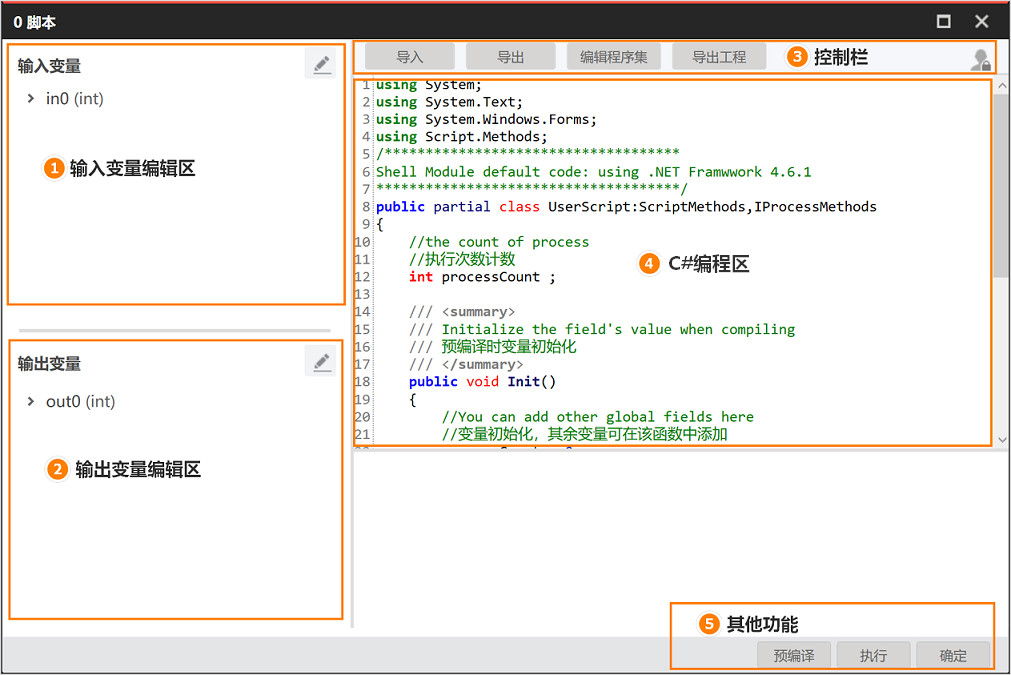脚本
可在流程中调用脚本模块,并通过自定义脚本代码控制流程数据或流程执行。
本节内容包含:
界面概览
将脚本模块拖入流程编辑区后,双击该模块打开脚本编辑窗口。
 图 1 脚本编辑窗口
图 1 脚本编辑窗口该窗口各区域说明如下:
|
窗口区域 |
描述 |
|---|---|
|
输入/输出变量编辑区 |
对输入输出的变量进行编辑,可自定义变量名称。支持六种数据类型,包括int、float、string、bytes、image(即图像数据)和ROIBOX(即ROI内的识别框)。
|
|
C#编程区 |
可在此处通过调用脚本接口等方式自定义开发脚本。 该区域提供脚本的默认代码,默认代码的简要解读参见下文的默认代码导读。 说明:
在C#编程区自定义脚本代码之前,需先在输入/输出变量编辑区定义输入变量(例如int型的in0)和输出变量(例如int型的out0)。完成定义后,可在C#编程区中直接编写代码,获取或设置数组类型以外类型的变量的取值。示例如下。 public bool Process()
{
int a = in0;
out0 = 32;
return true;
}
|
|
控制栏 |
|
|
其他功能 |
使用限制
-
脚本仅支持使用标准C#语言(Windows版本)进行编写。
-
脚本模块只能控制单个流程的执行逻辑。如需对方案下所有流程的批量执行逻辑进行控制,可通过全局脚本实现。
使用方法
-
调用脚本模块
在流程中调用脚本模块时,无针对前序/后序模块的特定要求。只要脚本逻辑与流程逻辑匹配,脚本模块可在流程中的任意环节调用。
-
自定义脚本代码
在流程中调用脚本模块后,可在C#编程区调用脚本接口自定义脚本代码。其中的核心接口为Init和Process。
-
可在Init方法中实现变量初始化和句柄创建等初始化逻辑,相关工作会在加载方案时完成。
-
可在Process方法中实现变量计算和逻辑处理等具体的功能,具体的功能在流程执行时执行。
 图 2 Init与Process方法的执行顺序
图 2 Init与Process方法的执行顺序
说明:脚本模块还支持调用C#程序集和非托管库,具体调用方法与全局脚本的第三方库调用相同,详情参见第三方库调用方法。
-
应用示例
脚本的具体应用示例,请参见应用示例:通信数据收发控制。
默认代码导读
脚本模块在C#编程区提供的默认代码如下。其中Init方法只有在加载方案或者修改代码后预编译时才会运行,Process方法在流程执行的时候运行。
可在public partial class UserScript:ScriptMethods,IProcessMethods中自行实现代码逻辑。
using System;
using System.Text;
using System.Windows.Forms;
using Script.Methods;
/************************************
Shell Module default code: using .NET Framwwork 4.6.1
*************************************/
public partial class UserScript:ScriptMethods,IProcessMethods
{
//the count of process
//执行次数计数
int processCount ;
/// <summary>
/// Initialize the field's value when compiling
/// 预编译时变量初始化
/// </summary>
public void Init()
{
//You can add other global fields here
//变量初始化,其余变量可在该函数中添加
processCount = 0;
}
/// <summary>
/// Enter the process function when running code once
/// 流程执行一次进入Process函数
/// </summary>
/// <returns></returns>
public bool Process()
{
//You can add your codes here, for realizing your desired function
//每次执行将进入该函数,此处添加所需的逻辑流程处理
return true;
}
}
脚本Demo源码
以下为脚本Demo文件ScriptDemo.cs的源码。该文件可从VM安装路径下获取,具体路径为:..\Applications\Module(sp)\x64\Logic\ShellModule。
using System;
using System.Text;
using System.Windows.Forms;
using Script.Methods;
public partial class UserScript:ScriptMethods,IProcessMethods
{
//the count of process
//执行次数计数
int processCount ;
/// <summary>
/// Initialize the field's value when compiling
/// 预编译时变量初始化
/// </summary>
public void Init()
{
//You can add other global fields here
//变量初始化,其余变量可在该函数中添加
processCount = 0;
}
/// <summary>
/// Enter the process function when running code once
/// 流程执行一次进入Process函数
/// </summary>
/// <returns></returns>
public bool Process()
{
//You can add your codes here, for realizing your desired function
//每次执行将进入该函数,此处添加所需的逻辑流程处理
//获取设置int
int a = 0;
GetIntValue("in0",ref a);
SetIntValue("out0", a);
//获取设置float
float f=0f;
GetFloatValue("in1",ref f);
SetFloatValue("out1", f);
//获取设置string
string s="";
GetStringValue("in2",ref s);
SetStringValue("out2", s);
//获取设置二进制数据
byte[] by = new byte[]{};
GetBytesValue("in8",ref by);
SetBytesValue("out8", by);
int count=0;
//获取设置int数组
int[] narry = new int[3];
GetIntArrayValue("in3",ref narry,out count);
SetIntArrayValue("out3",narry,0,narry.Length);
//获取设置float数组
float[] farry = new float[3];
GetFloatArrayValue("in4",ref farry,out count);
SetFloatArrayValue("out4",farry,0,farry.Length);
//获取设置strig数组
string[] sarry = new string[3];
GetStringArrayValue("in5",ref sarry,out count);
SetStringArrayValue("out5",sarry,0,sarry.Length);
//设置/获取16进制数据
byte[] tempBytes = new byte[] { };
GetBytesValue("in1", ref tempBytes);
SetBytesValue("out1", new byte[]{0x00,0x02});
//设置/获取图像数据
ImageData imagedata = new ImageData();
GetImageValue("in6", ref imagedata);
SetImageValue("out6", imagedata);
//设置/获取ROIBOX数据
RoiboxData roidata = new RoiboxData();
GetRoiboxValue("in7", ref roidata);
SetRoiboxValue("out7", roidata);
//设置全局变量
GlobalVariableModule.SetValue("var1", "323");
//2.获取全局变量
object paramValue = GlobalVariableModule.GetValue("var1");
//获取模块结果数据
//GetModule传入模块的名称,如果存在group中,需要加上group的名称
//GetValue() 传入的是模块的输出参数名称
object result = CurrentProcess.GetModule("图像源1").GetValue("Height");
object result1 = CurrentProcess.GetModule("组合模块1.图像源1").GetValue("Height");
//设置模块运行参数
//如果该模块在group内部,需要加上group模块的参数名称
//SetValue(),key值为具体的参数名称,
CurrentProcess.GetModule("BLOB分析1").SetValue("FindNum", "4");
CurrentProcess.GetModule("组合模块1.BLOB分析1").SetValue("FindNum", "4");
//5.通信发送数据
//GetDevice(int index), index为通信设备的ID
//tcp,udp,串口发送数据调用函数
GlobalCommunicateModule.GetDevice(1).SendData("msg",DataType.StringType);
//plc设备发送数据
//GetAddress(int index),index为address的ID
GlobalCommunicateModule.GetDevice(2).GetAddress(1).SendData("100",DataType.IntType);
GlobalCommunicateModule.GetDevice(2).GetAddress(1).SendData("100",DataType.StringType);
GlobalCommunicateModule.GetDevice(2).GetAddress(1).SendData("100",DataType.FloatType);
//modbus发送设备数据
GlobalCommunicateModule.GetDevice(3).GetAddress(1).SendData("100",DataType.IntType);
GlobalCommunicateModule.GetDevice(3).GetAddress(1).SendData("100",DataType.StringType);
GlobalCommunicateModule.GetDevice(3).GetAddress(1).SendData("100",DataType.FloatType);
return true;
}
}